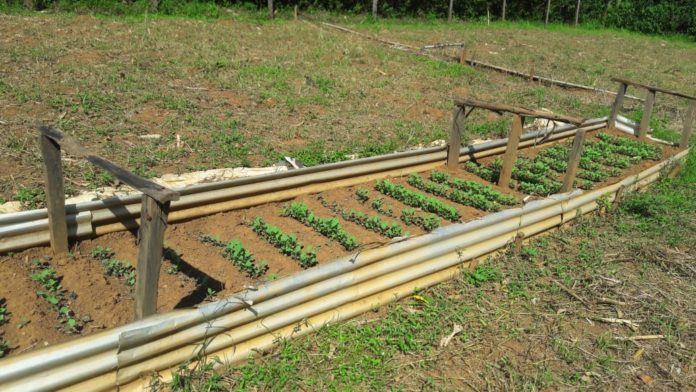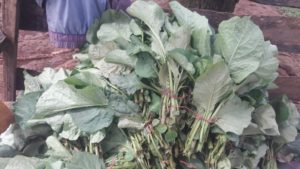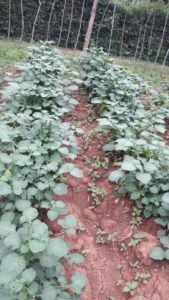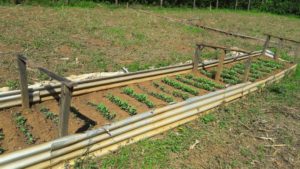By Lilian Mukoche
Kakamega County, Kenya: Professor Mary Abukutsa, a professor of horticulture at JKUAT, once said that “let your food be your medicine and your medicine be your food.” Therefore, the food one consumes has a great influence on whether the body is built or destroyed.
People around the world are faced with pervasive health threats due to a lack of significant micronutrients such as vitamins and mineral salts in the food they consume.
This is attributed to the increased consumption of modernized foods like fast foods which are high in chemicals that are hazardous to one’s health.
There has been a rapid increase in cases of chronic diseases and conditions like high blood pressure, diabetes, cancer, and obesity among others.
These diseases are mostly caused by one’s lifestyle.
There is a wrong assumption that chronic diseases mainly affect rich people, which is not the case for poor people are more likely to develop these conditions with a high probability of death due to lack of the appropriate care.
Research conducted by Patrick Maundu and his colleagues from Biodiversity International indicates that such health conditions are common in developing countries because many people residing in these countries live below average lives.
They can only afford cheap food with simplified diets that are mostly carbohydrates and fats filled.
Maundu in his report says that such people are little concerned about the nutritional value of food compared to placing food on the table for their families and for that reason, many suffer from poor health and malnutrition.
Health experts have always advised people to consume more vegetables and fruits than other portions of food in every meal.
Vegetables are known for their richness in vitamins, a very significant nutrient in a human’s body.
Clevin Aswani and Jane Njeri both clinical Officers at Masinde Muliro university of science and technology say indigenous vegetables have all their nutrients with no chemicals and therefore highly recommended for human consumption.
Among the vegetables advised by doctors, indigenous vegetables have been found to have more nutritional value, health benefits and contribute to improving food security.
Indigenous(traditional) vegetables are known to commonly originate from African countries and there are a diverse number of traditional vegetable species across the globe.
Examples of the most common species in Kenya include black nightshade (managu), cowpeas (kunde), pumpkin leaves (seveve), jute (mrenda), and crotalaria (mitoo) among many other varieties.
More research needs to be conducted to identify more species that people may not be aware of their existence.
Traditional vegetables are not only delicious but also highly nutritious. These vegetables contain substantial micronutrients like iron, calcium, vitamins, zinc, etc, compared to modern and exotic vegetables like cabbage or kales.
For instance, cowpeas commonly known as Kunde is a common vegetable that is rich in iron and vitamins. Black nightshade ‘ managu’ is common in Western Kenya as sutsa supplies the body with vitamins A and C, calcium, iron among other nutrients.
The introduction of exotic vegetables such as cabbage, carrots, tomatoes, etc in Africa saw a decline in the consumption of traditional vegetables. In the past, many Kenyans consumed indigenous vegetables more hence living longer healthier lives.
Prof. Abukutsa, who has always advocated for the consumption of African indigenous vegetables believes that the campaign to promote exotic vegetables made people forget their roots.
“After people were introduced to sukuma wiki and cabbages, they no longer see the worth of these treasures, as some even refer to them as weed or poor man’s food.”
With the increase of chronic diseases and malnutrition, proponents of traditional vegetables such as Prof. Abukutsa are advocating for and raising awareness of the importance of eating traditional vegetables.
These campaigns are bearing fruit because presently, these vegetables have become preferences in some of the households for many people have realized the power the traditional vegetables have in warding off lifestyle diseases.
Kefa Juma, a resident of Lurambi sub-county, Kakamega county is one of the people who have been diagnosed with diabetes and high blood pressure. He says he enjoys consuming traditional foods, including vegetables, ever since he found out he was sick.
“After my doctor diagnosed me, he advised me to take more vegetables especially indigenous ones and fruits. He said that they were good for my health and contain the high nutritional value that would boost my immunity to fight these diseases.”
He confirms that ever since he followed the doctor’s advice, he has become more strong and visits the hospital less frequently than before.
He adds that the demand for the vegetables that keep on growing due to the increased fan base forced him to plant his own supply in his piece of land.
“I would go to my supplier and sometimes not get my share because someone would have bought the vegetables already. I then decided to plant my own vegetables. They save me money and the hustle to go about searching for a seller.”
Mercy Saya, a student at Masinde Muliro University of Science and Technology, shares the same sentiments that not only are the vegetables in high demand, they are also expensive.
” Living in a town, it is sometimes hard to access these vegetables because people buying them are many. Also, the price is too high for a student like me that I consider buying kales worth KSh. 10 for a serving of two unlike KSh 50 for traditional vegetables.
Mama Mary, a vegetable vendor at Kakamega Market, explains that the high prices are attributed to the less supply of such vegetables in urban areas.
“In order to avail the vegetables for my clients in town, I have to look for them in the rural areas. This costs me extra for transportation back to town. At times, you find little quantity because not many farmers are planting them for sale.”
Although this is a challenge for her, she overlooks it and strives to provide her customers with the needed vegetables as she confirms they sell more than the modern ones.
‘When I bring my stock, these vegetables are bought more than sukuma wiki and cabbage. I, therefore, concentrate more on them.
Economic benefits
Apart from being rich sources of nutrients, Indigenous vegetables are also a good source of income to those that plant them.
This means they are an influence in shaping Kenya’s economy as most households mainly depend on agriculture for their livelihood.
Mama Mary and many local vendors in the Western region benefit commercially from selling indigenous vegetables. She says that the money she gets from her business helps her feed her family, educate her children, dress them and pay for other basic needs.
Apart from this group of businesspeople, there are those that have fully tapped into the monetary benefits that come with indigenous vegetables.
Local farmers have joined the agricultural practice of growing these vegetables on a large scale for it generates them good revenue.
Astariko Musundi, from Lurambi Sub-county, quitted his former hustle as a bodaboda operator to fully concentrate on this form of agriculture.
He discovered this treasure after he joined a community development group whose members engaged in traditional vegetable farming as their main project.
Upon seeing the benefits the project had to the group, he decided to halt his underpaying job in 2017 to concentrate more on his new hustle that has changed his life ever since.
”Initially, I was a bodaboda operator. The business had a low income that wouldn’t sustain me and my family. There are days we would sleep on empty stomachs because I wasn’t able to get even one customer. After joining the Jitegemee community development group, I saw the benefits we were ripping from the project of planting and selling traditional vegetables. I then started my own since I had acquired enough knowledge and skills on how to cultivate these gems.” said Musundi.
Musundi grows various vegetables such as Sutsa, seveve, kanzira, Mitoo, mrenda, and kunde in his 2 acres of land near his home. He has dedicated the whole of his land to grow vegetables only since he also stopped growing maize and beans, the most common combination of food crops grown by many farmers in this region.
Apart from his domestic consumption, Musundi testifies to reap a good fortune from his new hustle.
“I don’t buy vegetables in my home. Every green I eat comes from my farm. Apart from consuming them myself, I have benefited highly from growing these crops on a large scale. Upon harvesting, I supply them to individual households, vegetable vendors, nearby schools, and hotels.”
“The good thing is that market is readily available and so I don’t have a doubt that they won’t sell. From what I earn from this farming, I am able to sustain a much better and comfortable life for my family unlike before.”
Traditional vegetable farming has also built the economy by providing job opportunities to some of the youths. This has helped in curbing the high unemployment numbers in the country.
Kilmarx Lukoko, a 25-year-old from Butere Sub-county, also engages in this form of agriculture. This has become his main source of employment at the same time offering jobs to others who help him out at his farm.
“I started farming after my high school education. This was after both my parents passed away, leaving me and my siblings to fend for ourselves. Finding a job whose salary would cater to our needs was a bit hard. I, therefore, decided to use the piece of land left behind by my parents to engage in various forms of farming.”
Kilmarx says that he wasn’t fully settled until he ventured into horticulture, more so growing the traditional vegetables. From then, he concentrated on horticulture, becoming the biggest supplier of vegetables in his village and surrounding areas.
He advises the youths to have an open mind and become more technical and innovative when looking for a job. He believes that the reason why the unemployment rate is high in Kenya is that most youths have their egos and priorities in getting white-collar jobs, despising handy jobs like farming.
He’s proud of being his own employer and earns over 30,000 KSH monthly from his vegetable farm alone and advises his fellow youths to embrace this type of farming because It pays.


















Wonderful article. Green is the way to go it has a lot of health benefits and economic benefits. Thanks for the enlightenment
Comments are closed.